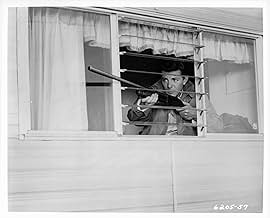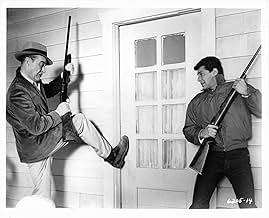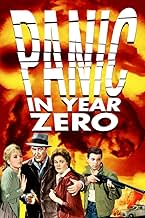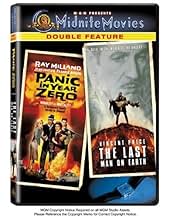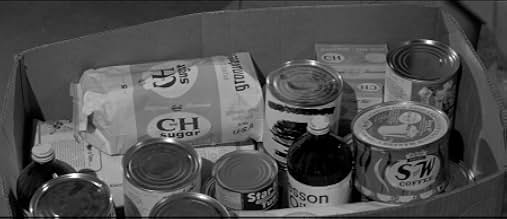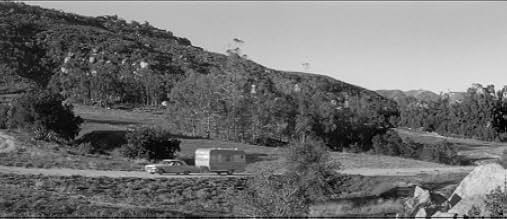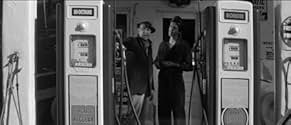NOTE IMDb
6,6/10
5,2 k
MA NOTE
Ajouter une intrigue dans votre langueA family leaves Los Angeles for a camping trip just before hydrogen bombs destroy the city. In the midst of the chaos, the father must fight to keep his family alive along the highway.A family leaves Los Angeles for a camping trip just before hydrogen bombs destroy the city. In the midst of the chaos, the father must fight to keep his family alive along the highway.A family leaves Los Angeles for a camping trip just before hydrogen bombs destroy the city. In the midst of the chaos, the father must fight to keep his family alive along the highway.
- Réalisation
- Scénario
- Casting principal
Neil Burstyn
- Andy
- (as Neil Nephew)
Chet Brandenburg
- Roadside Diner Customer
- (non crédité)
Ralph Clanton
- Radio Announcer
- (voix)
- (non crédité)
Kelton Crawford
- Looter
- (non crédité)
Avis à la une
One's expectations for an early-60s B movie from American International Pictures are never very high. But this movie was a surprisingly well thought out & thought-provoking story.
Just as a family has left LA for a vacation in the woods, the US suffers a massive nuclear attack on all its major cities from, uh, an unnamed enemy. (Wink wink...) But you won't find any marauding mutants here. In fact this film isn't about nuclear war per se. It really wants to explore the nature of civilized society. The father, well portrayed by Ray Milland, is grimly determined to protect his family at all costs for as long as it takes for order & civil authority to be restored, which he's sure will be a long time coming.
The father is a good man, but a little paranoid & controlling. This probably wouldn't be noticeable in normal times, but now they're in a panicked rush to escape the LA metro area & gather enough supplies to last for months in the wilderness - ahead of all the other people who are starting to clog up the freeways & empty out the grocery stores along the escape route. The contradiction between following the rules & protecting your loved ones in desperate times is very effectively illustrated as he makes some reckless decisions along the way.
Normally for a low budget 60's film like this, I wouldn't even bother thinking about how it could've been improved. But since it's so good at presenting a major moral dilemma in a realistic way, think of these nits as a sign of respect: Milland's character could use a little more introspection, but of course so could a lot of early 60's dads! (Not that Milland's performance was wooden - it was great. But his character had a very constricted personality.) His wife could use a little more assertiveness. She actually realizes this, and explains that she's still in shock over the attack - but after Sept. 11 a lot of us understand that after a good catharsis we can deal with a lot of trauma that initially would immobilize us. After having a good cry, she could've acted as a better conscience for some of the father's more paranoid acts. Also the daughter's character needed some fleshing out.
But of course this is an early 60's film, and clearly made on a low budget. And given its time & budget it is an amazing gem of a film. Definitely one to seek out!
Just as a family has left LA for a vacation in the woods, the US suffers a massive nuclear attack on all its major cities from, uh, an unnamed enemy. (Wink wink...) But you won't find any marauding mutants here. In fact this film isn't about nuclear war per se. It really wants to explore the nature of civilized society. The father, well portrayed by Ray Milland, is grimly determined to protect his family at all costs for as long as it takes for order & civil authority to be restored, which he's sure will be a long time coming.
The father is a good man, but a little paranoid & controlling. This probably wouldn't be noticeable in normal times, but now they're in a panicked rush to escape the LA metro area & gather enough supplies to last for months in the wilderness - ahead of all the other people who are starting to clog up the freeways & empty out the grocery stores along the escape route. The contradiction between following the rules & protecting your loved ones in desperate times is very effectively illustrated as he makes some reckless decisions along the way.
Normally for a low budget 60's film like this, I wouldn't even bother thinking about how it could've been improved. But since it's so good at presenting a major moral dilemma in a realistic way, think of these nits as a sign of respect: Milland's character could use a little more introspection, but of course so could a lot of early 60's dads! (Not that Milland's performance was wooden - it was great. But his character had a very constricted personality.) His wife could use a little more assertiveness. She actually realizes this, and explains that she's still in shock over the attack - but after Sept. 11 a lot of us understand that after a good catharsis we can deal with a lot of trauma that initially would immobilize us. After having a good cry, she could've acted as a better conscience for some of the father's more paranoid acts. Also the daughter's character needed some fleshing out.
But of course this is an early 60's film, and clearly made on a low budget. And given its time & budget it is an amazing gem of a film. Definitely one to seek out!
Ray Milland directs and stars in this gritty, cold war tale of a family trying to survive in the mountains after a nuclear war. Milland emphasises an 'everyone for themselves' survival ethic as his character struggles to keep his family alive at the expense of anyone who stands in his way. The movie was a low-budget project, so don't expect to see vistas of destroyed cities (you see one distant mushroom cloud) or any massive military presence (you see one jeep), but despite the cost-cutting "Panic in the Year Zero" is an effective early entry into the post-apocalyptic genre. Although mostly bloodless (a person shot at close range with a shotgun just hugs himself and topples over), the film is quite adult, with several cold-blood killings (on and off screen) and rapes (all off screen). The jazz music score, which is dated and excessive at times, detracts from the bleak tone of the movie, and the ending, while likely 'realistic', may not be a good match for some modern viewers' worldviews. Worth watching, even if only as only a celluloid relic of the cold-war.
Sure it didn't have a huge budget or major-league stars, but it's a bleak and realistic little drama that has an authentic tone and a sense of desperation that feels utterly genuine. There's undoubtedly a "you-had-to-be-there" reaction that I had to it, being from Los Angeles and knowing the mountain area and easily being able to imagine seeing that mushroom cloud in my own mind. I was eight when this originally came out -- not sure if I saw it in the theater but it's possible -- and that creepy Conalrad radio tone is still in my head after all these years.
Nobody -- except maybe Charlton Heston -- can look quite so anguished and masculine and bearing-the-weight-of-the-world-on-his-shoulders-in-the-face-of-civilization 's-downfall as Ray Milland does in this movie.
It looks like we dodged the nuclear war bullet back in the 1960s, but I'm sure that anybody living today can still identify with the terrifying prospect of a devastating nuclear war and what could happen if you were one of the lucky/unlucky survivors. This may not be "The Day After" but it's a plucky low-budget version of the same theme and worth seeing alongside other 60s nuclear nightmare movies.
Nobody -- except maybe Charlton Heston -- can look quite so anguished and masculine and bearing-the-weight-of-the-world-on-his-shoulders-in-the-face-of-civilization 's-downfall as Ray Milland does in this movie.
It looks like we dodged the nuclear war bullet back in the 1960s, but I'm sure that anybody living today can still identify with the terrifying prospect of a devastating nuclear war and what could happen if you were one of the lucky/unlucky survivors. This may not be "The Day After" but it's a plucky low-budget version of the same theme and worth seeing alongside other 60s nuclear nightmare movies.
This is a genuinely enjoyable example of a "post-nuclear holocaust survival
film." It may seem a bit campy by modern standards, but is actually well thought- out and acted. The early 60's were an era in which it seemed possible to
contemplate a nuclear war that broke down civilization's normal function
withOUT reducing the entire countryside to rubble. A man takes his family out into the country to escape the chaos, still clinging to the hope that normalcy and order will soon return. His wife is horrified at his newfound ruthlessness, and the kids seem willing to go with the new rules of the jungle.
Ray Milland was at one time an acclaimed actor, but his academy award for
"Lost Weekend" seems to have cursed his career. Now regarded as a "serious"
actor, suited only for "down" roles, he wasn't given much chance to work in the more "up" big-studio roles of the fifties. By the time he wound up at AIP, he was little more than a "has-been" to the public. But he retained real talent, as his directing and starring in this and other Sci-fi pictures of the period shows. When given a free hand, as in "Panic In Year Zero!" he took on challenges others
would have shied away from and showed that he still had a lot to offer. Sadly, big time directors continued to ignore him and the end of his life was defined by roles in "Frogs" and "The Thing With Two Heads" - films far worse than anything with Corman's name on them.
"Panic in Year Zero!" displays the basic conflict of compromise: Ray's character must compromise his beliefs and code of behavior in order to preserve what he cares for. His constant conflict with his wife displays the conflict between
differing ideas of what needs to be preserved - to her, saving the family by acts of savagery is unacceptable, and the only way to preserve civilization is to apply its rules in every situation. The ending seems to redeem Ray, but the fact is that the questions raised are answered by each viewer in the course of the film in his or her own way. Events in the film are not one-sided, and Ray's relation to the hardware store owner calls into question his position and correctness: perhaps by allying himself earlier with other decent people trying to survive, Ray could have saved his family from some of what it endures.
As we now re-acclimate ourselves to an era in which the possibility of "limited" nuclear attack (from national or independent terrorist groups) seems more likely than Mutual Assured Destruction, it is possible that films such as "Panic in Year Zero!" offer us important ethical problems. Problems we hope never to have to solve in real life, but which the screen offers a means to wrestle with in a safe environment.
film." It may seem a bit campy by modern standards, but is actually well thought- out and acted. The early 60's were an era in which it seemed possible to
contemplate a nuclear war that broke down civilization's normal function
withOUT reducing the entire countryside to rubble. A man takes his family out into the country to escape the chaos, still clinging to the hope that normalcy and order will soon return. His wife is horrified at his newfound ruthlessness, and the kids seem willing to go with the new rules of the jungle.
Ray Milland was at one time an acclaimed actor, but his academy award for
"Lost Weekend" seems to have cursed his career. Now regarded as a "serious"
actor, suited only for "down" roles, he wasn't given much chance to work in the more "up" big-studio roles of the fifties. By the time he wound up at AIP, he was little more than a "has-been" to the public. But he retained real talent, as his directing and starring in this and other Sci-fi pictures of the period shows. When given a free hand, as in "Panic In Year Zero!" he took on challenges others
would have shied away from and showed that he still had a lot to offer. Sadly, big time directors continued to ignore him and the end of his life was defined by roles in "Frogs" and "The Thing With Two Heads" - films far worse than anything with Corman's name on them.
"Panic in Year Zero!" displays the basic conflict of compromise: Ray's character must compromise his beliefs and code of behavior in order to preserve what he cares for. His constant conflict with his wife displays the conflict between
differing ideas of what needs to be preserved - to her, saving the family by acts of savagery is unacceptable, and the only way to preserve civilization is to apply its rules in every situation. The ending seems to redeem Ray, but the fact is that the questions raised are answered by each viewer in the course of the film in his or her own way. Events in the film are not one-sided, and Ray's relation to the hardware store owner calls into question his position and correctness: perhaps by allying himself earlier with other decent people trying to survive, Ray could have saved his family from some of what it endures.
As we now re-acclimate ourselves to an era in which the possibility of "limited" nuclear attack (from national or independent terrorist groups) seems more likely than Mutual Assured Destruction, it is possible that films such as "Panic in Year Zero!" offer us important ethical problems. Problems we hope never to have to solve in real life, but which the screen offers a means to wrestle with in a safe environment.
American International pics are pretty consistent lesser-grade pleasures. If you have a taste for them, there is a vast library of reasonably entertaining AIP movies out there. And occasionally they even outdo themselves. Panic in Year Zero is one of those better than average movies. Working with a typically low AIP budget, Milland, as director, concentrated on getting really fine performances out of the actors and telling his post-atomic war story by focusing on one family trying to find safety in isolation. Overall, it worked well and makes this a film worth seeing.
Le saviez-vous
- AnecdotesWhen the family is in the car at the beginning of the film and suspect something is happening, they cannot pick up any "CONELRAD" stations on the car's radio. CONELRAD (COntrol of ELectromagnetic RAdiation), established in 1951, was the first nationwide system for emergency broadcasts in the United States. All radios made between 1953 and 1963 were required to have marks on the AM dial at 640 and 1240 MHz where citizens were expected to tune to obtain civil defense information. CONELRAD was succeeded by the Emergency Broadcast System in 1963 (which did not use dedicated frequencies) and it, in turn, was replaced by the Emergency Alert System in 1997.
- GaffesIn the scene where the bridge is pulled down, to the left you can see bushes and the bridge pilings being pulled quickly in the opposite direction.
- Citations
Dr. Powell Strong: Now, you stay on the back roads. And you keep your gun handy. Our country is still full of thieving, murdering... "patriots."
- Crédits fousOther than the title, all credits are at the end of the movie.
- ConnexionsFeatured in Aweful Movies with Deadly Earnest: Panic in the Year Zero (1969)
Meilleurs choix
Connectez-vous pour évaluer et suivre la liste de favoris afin de recevoir des recommandations personnalisées
- How long is Panic in Year Zero!?Alimenté par Alexa
Détails
- Date de sortie
- Pays d’origine
- Langue
- Aussi connu sous le nom de
- ¿Habrá otro mañana?
- Lieux de tournage
- Société de production
- Voir plus de crédits d'entreprise sur IMDbPro
Box-office
- Budget
- 225 000 $US (estimé)
- Durée1 heure 33 minutes
- Couleur
- Mixage
- Rapport de forme
- 2.35 : 1
Contribuer à cette page
Suggérer une modification ou ajouter du contenu manquant

Lacune principale
By what name was Panique année zéro (1962) officially released in India in English?
Répondre

